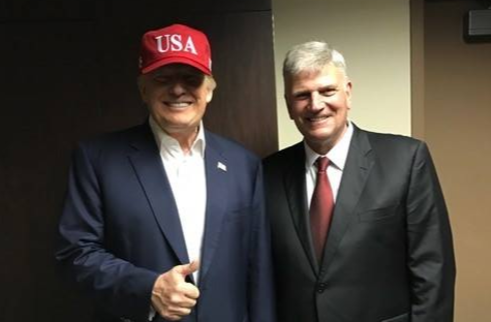Franklin Graham Defends Trump's Ban On Refugees: 'It's Not A Bible Issue'
Franklin Graham bucked the trend of evangelical condemnation at Trump's ban on refugees to defend the new president.
The son of evangelist Billy Graham cemented his position as Trump's pastor-in-chief by saying his plan to prevent refugees fleeing war-torn Syria coming to the US was "not a Bible issue".

President Trump is expected to sign executive orders this week for a temporary ban on refugees and migrants from Iraq, Syria, Iran, Sudan, Libya, Somalia, and Yemen.
Christians and other religious minorities are thought to be exempt from the temporary ban.
His comments prompted wholesale criticism from most evangelical leaders. National Association of Evangelicals and World Relief, a Christian NGO, both issued statements opposing the plans.
But Graham, who runs The Samaritan's Purse humanitarian organisation, told the Huffington Post Jesus' command to love and welcome the stranger did not mean the US should welcome more refugees.
"It's not a biblical command for the country to let everyone in who wants to come, that's not a Bible issue," he said.
"We want to love people, we want to be kind to people, we want to be considerate, but we have a country and a country should have order and there are laws that relate to immigration and I think we should follow those laws. Because of the dangers we see today in this world, we need to be very careful."
Asylum applicants to the US must go through a rigorous vetting process that takes between 18 and 24 months.
But Graham says it is not tough enough.
"I think it can be better," he said. "There are some very dangerous people in the world today, especially coming out of the Middle East."
The US has only taken 18,000 refugees from Syria since the conflict began in 2011. But Graham said he supported Trump's prioritising of Christians over Muslims and other religious groups.
"We live in a very dangerous world and I think the president's first priority is to protect the American people and until there is a better system in place for vetting and knowing who comes into America, I believe every person who comes unto the US should be vetted," Graham said. "We need to know who they are and what they believe, if they share the same core values of freedom and liberty."











